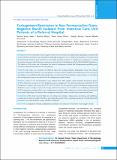Please use this identifier to cite or link to this item:
https://hdl.handle.net/20.500.14356/1043| Title: | Carbapenem Resistance in Non-Fermentative Gram-Negative Bacilli Isolated from Intensive Care Unit Patients of a Referral Hospital |
| Authors: | Yadav, Santosh Kumar Bhujel, Rajshree Mishra, Shyam Kumar Sharma, Sangita Sherchand, Jeevan Bahadur |
| Citation: | adavS. K., BhujelR., MishraS. K., SharmaS., & SherchandJ. B. (2021). Carbapenem Resistance in Non-Fermentative Gram-Negative Bacilli Isolated from Intensive Care Unit Patients of a Referral Hospital. Journal of Nepal Health Research Council, 19(1), 55-61. https://doi.org/10.33314/jnhrc.v19i1.3240 |
| Issue Date: | 2021 |
| Publisher: | Nepal Health Research Council |
| Article Type: | Original Article |
| Keywords: | Carbapenem-resistant Carbapenemase Intensive care unit Non-fermentative Gram-negative bacilli |
| Series/Report no.: | Jan-March, 2021;3240 |
| Abstract: | Abstract Background: Non-fermentative Gram-negative bacilli or non-fermenters are opportunistic pathogens associated with serious infections in intensive care unit patients. Although carbapenems were considered as a backbone of treatment for life-threatening infections, these bacteria are increasingly acquiring resistance to carbapenems. Carbapenem-resistant Acinetobacter baumannii and Pseudomonas aeruginosa are prioritized as critical pathogens by the World Health Organization. The objective of the study was to document the status of carbapenem-resistant and carbapenemase-producing non-fermenters isolated from intensive care unit patients. Methods: This study was conducted at Tribhuvan University Teaching Hospital, Kathmandu, Nepal. The clinical specimens collected from intensive care unit patients were processed for isolation and identification of non-fermenters and antibiotic susceptibility profile of bacterial isolates was determined. The multidrug-resistant isolates were identified and carbapenemase enzyme was detected in the carbapenem-resistant isolates. Results: A total of 157 non-fermenters were isolated from 1063 samples which included Acinetobacter species (n=85), Pseudomonas aeruginosa (n=55), Burkholderia cepacia complex (n=15), and Stenotrophomonas maltophilia (n=2). Carbapenem resistance was reported in 85.9%, 72.7%, and 33.3% of Acinetobacter species, Pseudomonas aeruginosa, and Burkholderia cepacia complex, respectively. Among total non-fermenters, 91.1% isolates were multidrug-resistant and 60.8% carbapenem-resistant isolates were carbapenemase producers. The carbapenem-resistant isolates demonstrated an extremely high degree of resistance than carbapenem-susceptible isolates towards other antimicrobial classes. Conclusions: This study reported high rates of carbapenem-resistant, carbapenemase-producing, and multidrug-resistant non-fermenters isolates. Therefore, preventing the spread of these superbugs among the critically ill patients in intensive care units should be a major initiative in hospitals. Keywords: Carbapenem-resistant; carbapenemase; intensive care unit; non-fermentative Gram-negative bacilli |
| Description: | Original Article |
| URI: | http://103.69.126.140:8080/handle/20.500.14356/1043 |
| ISSN: | Print ISSN: 1727-5482; Online ISSN: 1999-6217 |
| Appears in Collections: | Vol. 19 No. 1 (2021): Vol. 19 No. 1 Issue 50 Jan-Mar 2021 |
Files in This Item:
| File | Description | Size | Format | |
|---|---|---|---|---|
| 3240-Manuscript-21547-1-10-20210425.pdf | Fulltext Article. | 272.76 kB | Adobe PDF |  View/Open |
Items in DSpace are protected by copyright, with all rights reserved, unless otherwise indicated.
